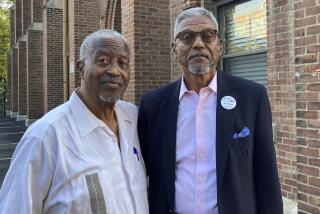Just the Threat of a Gas Attack Gets to Troops : Chemical warfare: Constant alerts are causing sleepless nights and jagged nerves among allied forces in the Persian Gulf. The possibility of death by poison gas “sends a shiver up my spine,” says one American officer.
- Share via
DHAHRAN, Saudi Arabia — Startled from her bunk by an explosion overhead, Army Pfc. Wendy Urich didn’t waste a second in spreading the word.
“Go to MOPP 4, Go to MOPP 4,” she screamed to her squadron mates, invoking the military’s highest alert for a possible chemical attack and sending troops scrambling into bulky, musty protective suits, complete with gas masks and rubber gloves.
It’s a scary, tense experience, yet some Operation Desert Storm troops would consider Urich lucky: She got some rest before the alert.
From desert ditches near the Kuwait and Iraq borders, to 270 miles south in the Saudi capital of Riyadh, troops are complaining that frequent chemical-attack alerts are causing sleepless nights.
Iraqi forces haven’t set foot in Saudi Arabia, and allied casualties in the war to free Kuwait are relatively low.
But Saddam Hussein and his Scuds clearly have the allied troops spooked.
“Everyone here can probably handle clean, quick death,” Marine Maj. Jack Carter said. “But there is something horribly dirty and alien to human nature about poison gas. It sends a shiver up my spine.”
Hussein has never proven that his Scud missiles can deliver chemical or biological warheads. But he says they can, and for safety’s sake, the allied troops are inclined to believe him.
Every time a Scud is launched from Iraq or Kuwait--or every time allied radar suspects such a launch--troops throughout the region are ordered into their chemical suits. Since most of the Scud firings come in the predawn hours, sleep can be hard to come by.
Pilots are complaining that they’re not getting enough shut-eye. Bleary-eyed ground forces digging in at new positions just south of the Kuwait and Iraq borders with Saudi Arabia say they’re not getting any sleep at all.
Pvt. Keith Wanser of the 82nd Airborne saw combat in Panama, filling a dangerous job as a forward scout who calls back enemy firing positions. The rapid-deployment unit is moving north toward the border--and a possible leading role in a ground war to liberate Kuwait.
Yet, said Wanser, “My concern is the chemical weapons.”
The Scuds are also scaring the Saudi public and American and other foreign workers in the oil-rich Eastern province and as far south as Riyadh, so knocking out Iraq’s missile launchers has become the top allied priority.
About 700 Americans have expressed interest in military airlifts from Saudi Arabia, and residents of north and central Saudi Arabia are heading south, out of Scud range.
As weapons of destruction, the inaccurate Scuds are second-rate, carrying relatively small warheads with conventional explosives--at least so far. But as weapons of terror, the Scuds have proven effective, both in Iraq’s eight-year war with Iran and in the early days of the Persian Gulf War, with volleys launched into Saudi Arabia and Israel.
The threat of chemical attack, of course, has existed since the first U.S. troops arrived on Saudi soil in the days after Iraq’s Aug. 2 invasion of Kuwait.
But it was not unusual then to see troops wandering on bases or even in Saudi towns without their gas masks. Now, the green belt pouches are a fixture, and some troops say they sleep with their mask pulled from its bag, clutched in their hands.
Sleeping soldiers with the 1st Infantry Division were awakened Saturday by cries of “Gas! Gas! Gas!” It turned out to be just one of many false alarms. But that didn’t stop the men from grumbling.
“I put my mask on and just waited to see what would happen,” said Lt. George Smith of Lakeland, Fla. “It definitely gets everyone’s blood going, then it takes a while to get back to sleep.”
More to Read
Sign up for Essential California
The most important California stories and recommendations in your inbox every morning.
You may occasionally receive promotional content from the Los Angeles Times.













